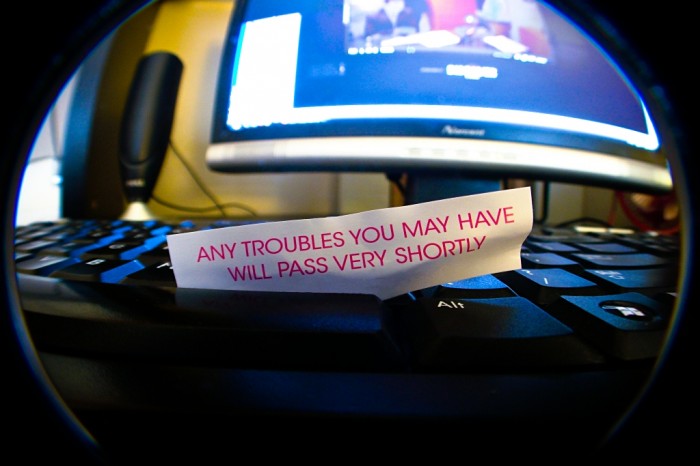
I had the chance to talk to a Buddhist Monk about some things that had been bothering me lately.
He listened patiently for five minutes of rambling and then told me that my troubles would pass.
I feel combative when I argue with a monk, but I found myself thinking “Yeah, but it would be crazy to want something sad or unfair to happen.”
He only repeated back to me, “You are suffering because you want something to be different than it is.”
As I wrestled with this idea I was reminded that the suffering he spoke of always boils down to the meaning I am placing on things. Whether something is good or bad has everything to do with my personal definition of ‘good’ or ‘bad,’ and situations are all neutral.
Some situations definitely tilt the scales toward bad, but what doesn’t change is my ability to still place any meaning I would like upon them.
When we look at situations and circumstances and recognize that we can control the meaning, it’s nice to know that we can control something.
But what about taking it to the next level? Can we place no meaning on situations at all? We are meaning machines, placing meanings on things almost the second we lay eyes on them.
I have come to believe that the monk wasn’t telling me to just shift my perspective and decide to be positive about it; he was telling me to stop insisting that it means anything at all.
We are emotional creatures and taking things personally comes so effortlessly that we would almost feel naked without doing so. If we don’t believe that things have to do with us, then we will feel minimized or unimportant.
We subconsciously weave ourselves into everything to create a sense of self-importance, and the interesting thing is that we don’t care whether it results in joy or suffering. The most important thing was that we mattered.
I want to invite you on the quest to go beyond optimism.
Forget just making situations have a positive spin and let’s stop spinning things at all. Meanings are exhausting, and almost always untrue.
The stories we tell ourselves lead to self-pity, one of the most insincere and pointless emotions of human kind. To stop placing meaning on everything we must first step down off the pedestal we built for ourselves.
Everything isn’t about us.
Someone once came to Buddha and said, “I want happiness,” and he said, “Remove ‘I’ and remove ‘want’… all that’s left is happiness.”
What do we want to be different right now? Maybe a job, relationship, finances, personal situation, or even a disease, a death, a deep loss, a way that we were once wronged, abused, or not loved sufficiently.
The all encompassing nature of the monk’s instruction to not want anything to be different than it is seems nearly impossible for the deepest of hurts. But a meditative lifestyle, a conscious one, asks just that.
Are we willing to stop taking life so personally and allow the circumstances surrounding us to be perfect simply because they are circumstances surrounding us? Even with the tough stuff and even with the really tough stuff?
Thomas Merton said, “The more you try to avoid suffering, the more you suffer, because smaller and more insignificant things begin to torture you, in proportion to your fear of being hurt. The one who does most to avoid suffering is, in the end, the one who suffers most.”
Here’s the thing about this topic—I’m realistic. We are not all Zen monks, at least not yet. Because we are humans we will inevitably suffer sometimes, at least while we are learning.
So wherever we can avoid suffering by not placing unnecessary meaning, do that. And when we find that level perspective out of reach, choose to experience it fully. In other words, be grown up enough to choose one or the other.
We either let the situation be neutral or we step up and absorb it completely. One way is easier—both are enlightened.
Love elephant and want to go steady?
Sign up for our (curated) daily and weekly newsletters!
Editorial Assistant: Paige Vignola / Editor: Renée Picard
Image via owlpacino on Flickr











Read 0 comments and reply